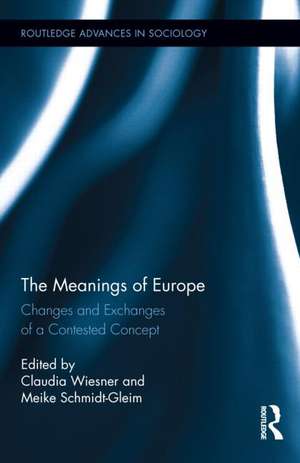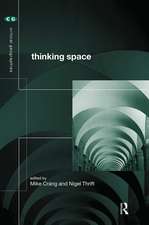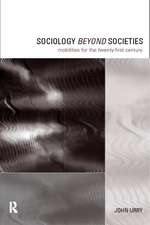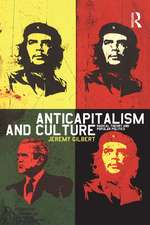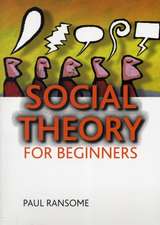The Meanings of Europe: Changes and Exchanges of a Contested Concept: Routledge Advances in Sociology
Editat de Claudia Wiesner, Meike Schmidt-Gleimen Limba Engleză Hardback – 27 dec 2013
| Toate formatele și edițiile | Preț | Express |
|---|---|---|
| Paperback (1) | 469.34 lei 6-8 săpt. | |
| Taylor & Francis – 23 aug 2018 | 469.34 lei 6-8 săpt. | |
| Hardback (1) | 1062.98 lei 6-8 săpt. | |
| Taylor & Francis – 27 dec 2013 | 1062.98 lei 6-8 săpt. |
Din seria Routledge Advances in Sociology
-
 Preț: 385.10 lei
Preț: 385.10 lei -
 Preț: 152.38 lei
Preț: 152.38 lei -
 Preț: 309.12 lei
Preț: 309.12 lei - 20%
 Preț: 290.36 lei
Preț: 290.36 lei -
 Preț: 326.49 lei
Preț: 326.49 lei -
 Preț: 204.46 lei
Preț: 204.46 lei - 9%
 Preț: 865.97 lei
Preț: 865.97 lei -
 Preț: 317.19 lei
Preț: 317.19 lei -
 Preț: 326.40 lei
Preț: 326.40 lei -
 Preț: 311.41 lei
Preț: 311.41 lei - 8%
 Preț: 388.97 lei
Preț: 388.97 lei -
 Preț: 288.80 lei
Preț: 288.80 lei -
 Preț: 311.33 lei
Preț: 311.33 lei -
 Preț: 311.41 lei
Preț: 311.41 lei -
 Preț: 303.42 lei
Preț: 303.42 lei -
 Preț: 301.50 lei
Preț: 301.50 lei -
 Preț: 329.09 lei
Preț: 329.09 lei -
 Preț: 152.29 lei
Preț: 152.29 lei -
 Preț: 311.41 lei
Preț: 311.41 lei -
 Preț: 310.08 lei
Preț: 310.08 lei -
 Preț: 316.13 lei
Preț: 316.13 lei -
 Preț: 152.99 lei
Preț: 152.99 lei -
 Preț: 326.49 lei
Preț: 326.49 lei -
 Preț: 309.46 lei
Preț: 309.46 lei -
 Preț: 386.77 lei
Preț: 386.77 lei - 8%
 Preț: 388.91 lei
Preț: 388.91 lei -
 Preț: 310.60 lei
Preț: 310.60 lei -
 Preț: 310.22 lei
Preț: 310.22 lei -
 Preț: 310.51 lei
Preț: 310.51 lei -
 Preț: 283.77 lei
Preț: 283.77 lei -
 Preț: 311.41 lei
Preț: 311.41 lei -
 Preț: 295.09 lei
Preț: 295.09 lei - 8%
 Preț: 383.57 lei
Preț: 383.57 lei - 18%
 Preț: 1111.55 lei
Preț: 1111.55 lei -
 Preț: 448.44 lei
Preț: 448.44 lei - 18%
 Preț: 704.48 lei
Preț: 704.48 lei - 18%
 Preț: 1053.92 lei
Preț: 1053.92 lei - 18%
 Preț: 1002.36 lei
Preț: 1002.36 lei - 18%
 Preț: 1057.89 lei
Preț: 1057.89 lei - 16%
 Preț: 248.31 lei
Preț: 248.31 lei - 18%
 Preț: 1003.30 lei
Preț: 1003.30 lei - 18%
 Preț: 1109.21 lei
Preț: 1109.21 lei - 18%
 Preț: 997.11 lei
Preț: 997.11 lei - 18%
 Preț: 1061.22 lei
Preț: 1061.22 lei - 18%
 Preț: 1058.06 lei
Preț: 1058.06 lei - 18%
 Preț: 1002.36 lei
Preț: 1002.36 lei - 18%
 Preț: 1113.12 lei
Preț: 1113.12 lei
Preț: 1062.98 lei
Preț vechi: 1296.31 lei
-18% Nou
Puncte Express: 1594
Preț estimativ în valută:
203.45€ • 211.60$ • 170.49£
203.45€ • 211.60$ • 170.49£
Carte tipărită la comandă
Livrare economică 13-27 martie
Preluare comenzi: 021 569.72.76
Specificații
ISBN-13: 9780415857062
ISBN-10: 0415857066
Pagini: 284
Ilustrații: 11 black & white illustrations, 3 black & white tables, 10 black & white halftones, 1 black & white line drawings
Dimensiuni: 152 x 229 x 20 mm
Greutate: 0.69 kg
Ediția:New.
Editura: Taylor & Francis
Colecția Routledge
Seria Routledge Advances in Sociology
Locul publicării:Oxford, United Kingdom
ISBN-10: 0415857066
Pagini: 284
Ilustrații: 11 black & white illustrations, 3 black & white tables, 10 black & white halftones, 1 black & white line drawings
Dimensiuni: 152 x 229 x 20 mm
Greutate: 0.69 kg
Ediția:New.
Editura: Taylor & Francis
Colecția Routledge
Seria Routledge Advances in Sociology
Locul publicării:Oxford, United Kingdom
Public țintă
Postgraduate and UndergraduateCuprins
The Meanings of Europe: Introduction Meike Schmidt-Gleim and Claudia Wiesner Part I: Meanings of Europe 1. The Plural Meanings of Europe: A Historical Task Nere Basabe 2. Europe and the Spectre of the Barbarian Meike Schmidt-Gleim 3. In the Grip of Marranism: The Other Within Europe´s Multiple Modernities Paola Ferruta 4. "In Europe There Are Positions to Defend": The 1930s and Walter Benjamin’s Jewish Ark Marc Berdet 5. Parliamentarism as a European Type of Polity: Constructing the Presidentialism Versus Parliamentarism Divide in Walter Bagehot’s English Constitution Kari Palonen Part II: Europe and the EU 6. From Safeguarding Peace in Europe to Financial Crisis: Old Questions and New Challenges of European Integration Claudia Wiesner 7. The Symbolical Revocation of Symbolism: The Lisbon Treaty Hans Lietzmann 8. The Paradoxes of a European Citizenship Helmut Dubiel 9. Constructing Europe as an Area via EU Documents on Citizenship and Culture Katja Mäkinen 10. Assigning Meaning to (EU-)Europe Through Cultural Policy: European Capitals of Culture Emilia Palonen 11. Euro-Zone Crisis and Parliamentary Democracy: Lessons from the Greek Case Anthoula Malkopoulou Part III: Europeanness and Non-Europeanness 12. Scenes of Voting: Reactions to the Swiss Referendum on the Ban on the Construction of Minarets (2009) in Switzerland and Germany Andreas Langenohl 13. Translating Citizenship: On Some Pitfalls and the Politics of Meaning in the Definition of "Europeanness" Stefan Nowotny 14. "Wherever You Go, You Will Be the Polis": Europe Without Borders Tuija Parvikko 15. Shaping New Russian Identity: Discourses of "Inclusion/Exclusion in Europe" Galina Zvereva 16. Europe’s Ends Kalypso Nicolaidis
Descriere
What is Europe? What are the contents of the concept of Europe? And what defines European identity? Instead of only asking these classical questions, this volume also explores who asks these questions, and who is addressed with such questions. Who answers the questions, from which standpoints and for what reasons? Which philosophical, historical, religious or political traditions influence the answers? This volume produces a complex and plural picture of the concepts, ideas, debates and (ex)changes associated with the concept of Europe, and has a clear significance for today’s debates on European identity, Europeanization, and the EU.
